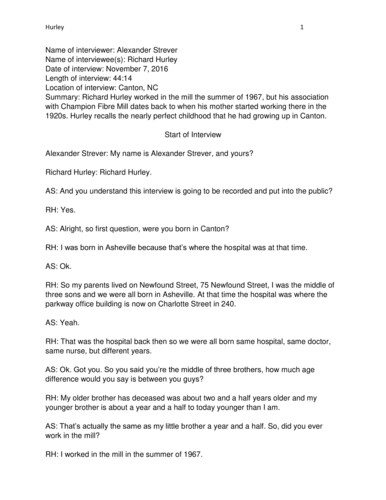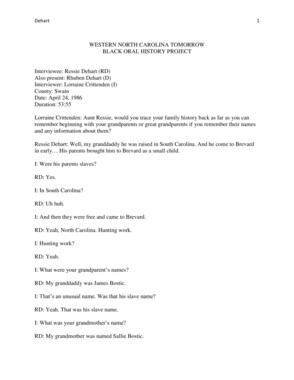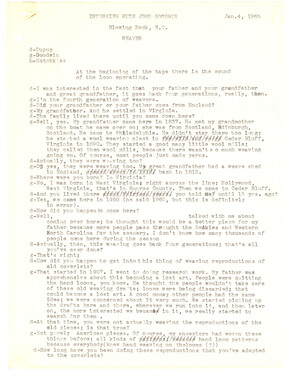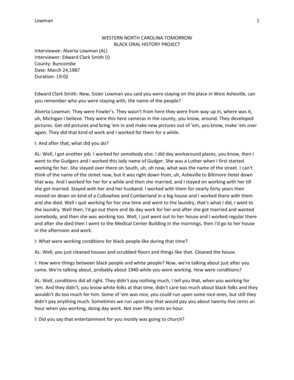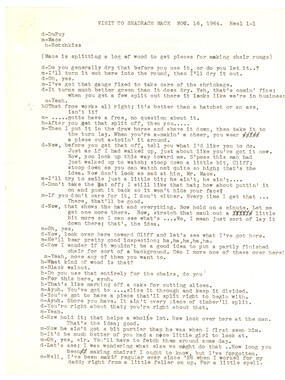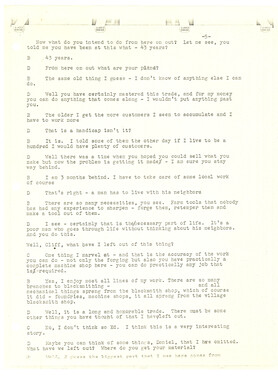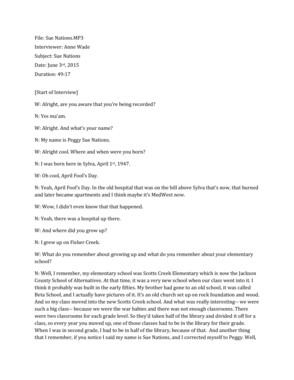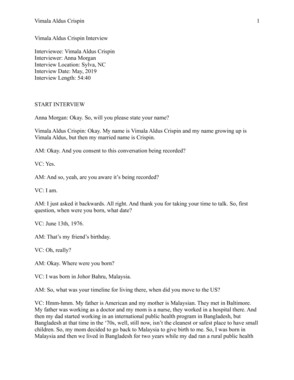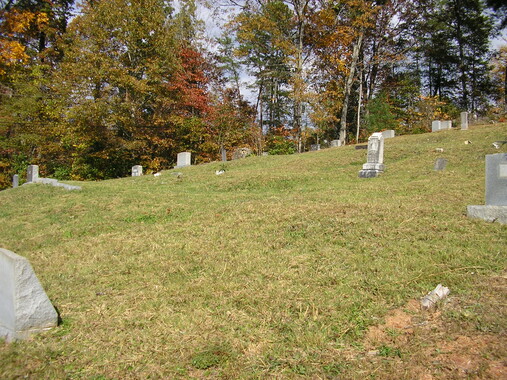Western Carolina University (20)
View all
- Canton Champion Fibre Company (2308)
- Cherokee Traditions (293)
- Civil War in Southern Appalachia (165)
- Craft Revival (1942)
- Great Smoky Mountains - A Park for America (2767)
- Highlights from Western Carolina University (430)
- Horace Kephart (941)
- Journeys Through Jackson (154)
- LGBTQIA+ Archive of Jackson County (19)
- Oral Histories of Western North Carolina (314)
- Picturing Appalachia (6679)
- Stories of Mountain Folk (413)
- Travel Western North Carolina (160)
- Western Carolina University Fine Art Museum Vitreograph Collection (129)
- Western Carolina University Herbarium (92)
- Western Carolina University: Making Memories (708)
- Western Carolina University Publications (2283)
- Western Carolina University Restricted Electronic Theses and Dissertations (146)
- Western North Carolina Regional Maps (71)
- World War II in Southern Appalachia (131)
University of North Carolina Asheville (6)
View all
- 1700s (1)
- 1860s (1)
- 1890s (1)
- 1900s (2)
- 1920s (2)
- 1930s (5)
- 1940s (12)
- 1950s (19)
- 1960s (35)
- 1970s (31)
- 1980s (16)
- 1990s (10)
- 2000s (20)
- 2010s (24)
- 2020s (4)
- 1600s (0)
- 1800s (0)
- 1810s (0)
- 1820s (0)
- 1830s (0)
- 1840s (0)
- 1850s (0)
- 1870s (0)
- 1880s (0)
- 1910s (0)
- Appalachian Region, Southern (15)
- Asheville (N.C.) (11)
- Avery County (N.C.) (1)
- Buncombe County (N.C.) (55)
- Cherokee County (N.C.) (17)
- Clay County (N.C.) (2)
- Graham County (N.C.) (15)
- Great Smoky Mountains National Park (N.C. and Tenn.) (1)
- Haywood County (N.C.) (40)
- Henderson County (N.C.) (5)
- Jackson County (N.C.) (131)
- Knox County (Tenn.) (1)
- Macon County (N.C.) (17)
- Madison County (N.C.) (4)
- McDowell County (N.C.) (1)
- Mitchell County (N.C.) (5)
- Polk County (N.C.) (3)
- Qualla Boundary (6)
- Rutherford County (N.C.) (1)
- Swain County (N.C.) (30)
- Watauga County (N.C.) (2)
- Waynesville (N.C.) (1)
- Yancey County (N.C.) (3)
- Blount County (Tenn.) (0)
- Knoxville (Tenn.) (0)
- Lake Santeetlah (N.C.) (0)
- Transylvania County (N.C.) (0)
- Interviews (314)
- Manuscripts (documents) (3)
- Personal Narratives (7)
- Photographs (4)
- Sound Recordings (308)
- Transcripts (216)
- Aerial Photographs (0)
- Aerial Views (0)
- Albums (books) (0)
- Articles (0)
- Artifacts (object Genre) (0)
- Biography (general Genre) (0)
- Cards (information Artifacts) (0)
- Clippings (information Artifacts) (0)
- Crafts (art Genres) (0)
- Depictions (visual Works) (0)
- Design Drawings (0)
- Drawings (visual Works) (0)
- Envelopes (0)
- Facsimiles (reproductions) (0)
- Fiction (general Genre) (0)
- Financial Records (0)
- Fliers (printed Matter) (0)
- Glass Plate Negatives (0)
- Guidebooks (0)
- Internegatives (0)
- Land Surveys (0)
- Letters (correspondence) (0)
- Maps (documents) (0)
- Memorandums (0)
- Minutes (administrative Records) (0)
- Negatives (photographs) (0)
- Newsletters (0)
- Newspapers (0)
- Occupation Currency (0)
- Paintings (visual Works) (0)
- Pen And Ink Drawings (0)
- Periodicals (0)
- Plans (maps) (0)
- Poetry (0)
- Portraits (0)
- Postcards (0)
- Programs (documents) (0)
- Publications (documents) (0)
- Questionnaires (0)
- Scrapbooks (0)
- Sheet Music (0)
- Slides (photographs) (0)
- Specimens (0)
- Speeches (documents) (0)
- Text Messages (0)
- Tintypes (photographs) (0)
- Video Recordings (physical Artifacts) (0)
- Vitreographs (0)
- WCU Mountain Heritage Center Oral Histories (25)
- WCU Oral History Collection - Mountain People, Mountain Lives (71)
- Western North Carolina Tomorrow Black Oral History Project (69)
- A.L. Ensley Collection (0)
- Appalachian Industrial School Records (0)
- Appalachian National Park Association Records (0)
- Axley-Meroney Collection (0)
- Bayard Wootten Photograph Collection (0)
- Bethel Rural Community Organization Collection (0)
- Blumer Collection (0)
- C.W. Slagle Collection (0)
- Canton Area Historical Museum (0)
- Carlos C. Campbell Collection (0)
- Cataloochee History Project (0)
- Cherokee Studies Collection (0)
- Daisy Dame Photograph Album (0)
- Daniel Boone VI Collection (0)
- Doris Ulmann Photograph Collection (0)
- Elizabeth H. Lasley Collection (0)
- Elizabeth Woolworth Szold Fleharty Collection (0)
- Frank Fry Collection (0)
- George Masa Collection (0)
- Gideon Laney Collection (0)
- Hazel Scarborough Collection (0)
- Hiram C. Wilburn Papers (0)
- Historic Photographs Collection (0)
- Horace Kephart Collection (0)
- Humbard Collection (0)
- Hunter and Weaver Families Collection (0)
- I. D. Blumenthal Collection (0)
- Isadora Williams Collection (0)
- Jesse Bryson Stalcup Collection (0)
- Jim Thompson Collection (0)
- John B. Battle Collection (0)
- John C. Campbell Folk School Records (0)
- John Parris Collection (0)
- Judaculla Rock project (0)
- Kelly Bennett Collection (0)
- Love Family Papers (0)
- Major Wiley Parris Civil War Letters (0)
- Map Collection (0)
- McFee-Misemer Civil War Letters (0)
- Mountain Heritage Center Collection (0)
- Norburn - Robertson - Thomson Families Collection (0)
- Pauline Hood Collection (0)
- Pre-Guild Collection (0)
- Qualla Arts and Crafts Mutual Collection (0)
- R.A. Romanes Collection (0)
- Rosser H. Taylor Collection (0)
- Samuel Robert Owens Collection (0)
- Sara Madison Collection (0)
- Sherrill Studio Photo Collection (0)
- Smoky Mountains Hiking Club Collection (0)
- Stories of Mountain Folk - Radio Programs (0)
- The Reporter, Western Carolina University (0)
- Venoy and Elizabeth Reed Collection (0)
- WCU Gender and Sexuality Oral History Project (0)
- WCU Students Newspapers Collection (0)
- William Williams Stringfield Collection (0)
- Zebulon Weaver Collection (0)
- African Americans (97)
- Artisans (5)
- Cherokee pottery (1)
- Cherokee women (1)
- College student newspapers and periodicals (4)
- Education (3)
- Floods (13)
- Folk music (3)
- Great Smoky Mountains National Park (N.C. and Tenn.) (1)
- Hunting (1)
- Mines and mineral resources (2)
- Rural electrification -- North Carolina, Western (2)
- School integration -- Southern States (2)
- Segregation -- North Carolina, Western (5)
- Slavery (5)
- Sports (2)
- Storytelling (3)
- World War, 1939-1945 (3)
- Appalachian Trail (0)
- Cherokee art (0)
- Cherokee artists -- North Carolina (0)
- Cherokee language (0)
- Church buildings (0)
- Civilian Conservation Corps (U.S.) (0)
- Dams (0)
- Dance (0)
- Forced removal, 1813-1903 (0)
- Forest conservation (0)
- Forests and forestry (0)
- Gender nonconformity (0)
- Landscape photography (0)
- Logging (0)
- Maps (0)
- North Carolina -- Maps (0)
- Paper industry (0)
- Postcards (0)
- Pottery (0)
- Railroad trains (0)
- Waterfalls -- Great Smoky Mountains (N.C. and Tenn.) (0)
- Weaving -- Appalachian Region, Southern (0)
- Wood-carving -- Appalachian Region, Southern (0)
- Sound (308)
- StillImage (4)
- Text (219)
- MovingImage (0)
Interview with Richard Hurley
Item
Item’s are ‘child’ level descriptions to ‘parent’ objects, (e.g. one page of a whole book).
-
-
Hurley 1 Name of interviewer: Alexander Strever Name of interviewee(s): Richard Hurley Date of interview: November 7, 2016 Length of interview: 44:14 Location of interview: Canton, NC Summary: Richard Hurley worked in the mill the summer of 1967, but his association with Champion Fibre Mill dates back to when his mother started working there in the 1920s. Hurley recalls the nearly perfect childhood that he had growing up in Canton. Start of Interview Alexander Strever: My name is Alexander Strever, and yours? Richard Hurley: Richard Hurley. AS: And you understand this interview is going to be recorded and put into the public? RH: Yes. AS: Alright, so first question, were you born in Canton? RH: I was born in Asheville because that’s where the hospital was at that time. AS: Ok. RH: So my parents lived on Newfound Street, 75 Newfound Street, I was the middle of three sons and we were all born in Asheville. At that time the hospital was where the parkway office building is now on Charlotte Street in 240. AS: Yeah. RH: That was the hospital back then so we were all born same hospital, same doctor, same nurse, but different years. AS: Ok. Got you. So you said you’re the middle of three brothers, how much age difference would you say is between you guys? RH: My older brother has deceased was about two and a half years older and my younger brother is about a year and a half to today younger than I am. AS: That’s actually the same as my little brother a year and a half. So, did you ever work in the mill? RH: I worked in the mill in the summer of 1967. Hurley 2 AS: Ok. RH: As a college student I was a junior at UNC Chapel Hill at that time and they had a work program for summer kids which is a great program. Prior to that I had worked at Camp Hope, and do you know about Camp Hope? AS: I don’t know about Camp Hope? RH: We’ll talk about that some because there’s a link between Camp Hope and the mill. AS: Alright. RH: But anyway I had worked there in the summer of ‘67 and was probably the best summer I’ve ever had because I learned so much about how the mill worked, I learned about industry, I learned about manufacturing, and enough to where I became employed at the Square D where I had a 34-year career as human resources manager which is a major electrical equipment manufacturer. One of the things that helped me get my job was that my boss, the guy that hired me, said you have some industrial experience and I said three months, and he said that’s better than nothing. So that helped me get my job coincidentally. AS: So you said Camp Hope in Canton had a connection? How exactly? RH: To go back a bit historically, you talking about my having worked there, my parents, my mother was a local girl, and my father was from Providence, Rhode Island. AS: Ok. RH: Moved down here in 1936 he was a Phi Beta Cappa from Brown University, moved to Asheville, coincidently was F. Scott Fitzgerald’s personal secretary for about a year. And during the depression time he needed a quote on quote real job so he got a job here at Champion, at that time Champion Papers which is now Evergreen. In today’s terms he would be considered a systems analyst, a manufacturer system analyst, but married my mom so that’s why I’m here. Because he stayed here and never went back north to raise the family. AS: So really Champion is the reason why you stayed down here? RH: That’s the reason he stayed down here. He never left here and raised his kids here. And when I graduated from then Canton High School in 1964 I went to Chapel Hill did the four-year thing, then service after that which as obligatory at that time because Vietnam was at full blast. I did two years of active service then came out went to work at Square D right after that. But going back to Camp Hope, can I just ramble? Hurley 3 AS: Oh yeah go ahead. RH: Because if I’m starting to cover some of your questions reign me in. AS: Oh yeah your fine. RH: But to give you some historic perspective my mother had worked there back in the 20’s and of course you’re aware Champion started in 1903? AS: Yeah. RH: I don’t remember the exact date. Anyway she worked there in the 20’s the main office they called it, she worked in the Accounting department. She also had a little tea room here which is called Martin’s tea room. She ran that and that was the meeting place of the folks back then and my grandmother who lived up on Academy Street here would make the pies for them to sell down there at Martin’s tea room. AS: Ok. RH: So it was kind of the humming place for the people to go eat breakfast, whatever, anyhow. So then met my dad. He worked he was an old timer, old timer meant he had 25 years. So, my roots go back, all the way back into the 20’s as far as when my mother worked there. And Ruben B. Robertson, you know the name Ruben B. Robertson? AS: Yeah. RH: Ruben B. Robertson’s wife’s name was Hope, Hope Robertson. And Champion had owned a lot of land around here as you’re probably aware, to renew their raw material being wood, pine wood in particular. So there’s a camp up 276, are you familiar with that past Spring Dale, that’s Camp Hope up there which is a Y camp. AS: Ok. RH: And there’s a picture in the hall I’ll show you as we go back out that shows the kids around their little cabins. So that’s where the kids of my generation went to Camp Hope. They had three weeks of girl’s camp and three weeks of boy’s camp. The point I’m making is it was basically owned my Champion. AS: Yeah. RH: And they’re was also a YMCA are you familiar with that? They had two YMCA’s here? Hurley 4 AS: Yeah. RH: Carol may have talked about that. The old Y is where number 19 paper machine is, have you heard about that story? AS: I did not actually. RH: Ok, well you know where the main office is? AS: Yes. RH: Right behind there is number 19 machine to the right. In my generation growing up the YMCA was right there. This big brick building, and all us kids growing up in the early 50s learned how to swim down at the Y, we had a pool room in there and learned how to play pool. We learned, we played basketball in there and we had our first sweaty palms, quote, unquote sock hops which were the dances in the age of early teens. I don’t know whether you want to use that term or not, but anyway, that’s where we had our first little dances, they had a hop on Saturday night, we had square dancing down there. So it was a real focal hub of community activity. In the lobby of the YMCA had checker boards and these old timers would be playing checkers, and it was a very homey sort of environment. That all disappeared around 1962 when they tore down the Y and built, brought in number 19, the big board machine. They subsequently built the new Y which is right down the road, where the school now, but that Y’s been closed [inaudible]. But anyway Camp Hope, Camp Hope was part of the Y world and then of course we had little league baseball, little league football, and all the Termites, Mites, whatever they called them. Midget football was what it was, but all that stuff was part of the weave of the culture, woven into the culture of kids growing up here in the 50’s, the 60s. Another significant part of it was the company store, have you heard about the company store? AS: I have heard about the company store Carol talked a lot about it. RH: And there’s the old Tennessee Ernie song Sixteen Tons, I don’t know if you’ve ever heard of that? AS: Yeah. RH: Sixteen Tons talked about owe my soul to the company store. A lot of the plants of that era had company stores and employees could go buy their food and stuff through the company store. AS: Yep. RH: To ramble a little bit. [Laughter] Hurley 5 AH: Oh you’re fine. So I actually know somebody that grew up in Canton from back at campus and they talked about how when they were in school there was a lot of courses that had some connection, or could be beneficial to the mill. Did you have the same thing growing up in school? RH: Courses in high school? AS: Yes. RH: No. AS: Ok. RH: You mean as far as tied in with the local culture of the mill? AS: Sort of, they were classes that can be considered vocational classes that gave you an idea of what you would do in the mill. RH: I got you. Did not have that when I was in school. Now they had shop, welding, the non-college prep curriculum had shop and welding. There was a lot of guys in my generation, back in that era many of the guys and the generations before me, plant started in 1903, you had people, their sons, it was just automatic. You went to work in the mill. That was before women, well women were employed there at the mill, I mean it was like when I was getting out of high school. The guys went straight form high school straight to the mill and they had 40 year careers or whatever. I remember a neighbor Mr. Tramble lived down the street from me, I grew up in 75 Newfound Street, I remember when Mr. Tramble celebrated his 50th anniversary with the mill. So that was quite common with people that worked at the mill. My take on the mill, and we all call it the mill, my take on the mill was that I really appreciated, since I worked in industry and had a career in management Square D, I look back at those days of working there that summer and the things that I learned that summer, and I look back at the culture of the mill, and I look at what a cultural component it was for the town of Canton because it kind of is the town of Canton if you will from that stand point. It’s the primary source of revenue for people that obviously worked there and a lot of people live here. The advent of the interstate in 1964 or thereabouts has changed that dynamic somewhat. From the standpoint where now you have people that… it’s nothing to… when I was a kid to go to Asheville was a big deal. Now it’s15 minutes away. So I lived here before I moved to Asheville, I lived here and worked at Square D and drove everyday and didn’t think anything about it. But a little interesting statistic about the mill is that, and about Canton in general, in 1960 the highest per capita income in the state of North Carolina was Canton and Chapel Hill. The highest capita income that says a lot, people do not realize how much money this town, the employees made and it was a good employment for them, a good place to work, and very paternalistic when Mr. Robertson was here. I Hurley 6 remember Mr. Robertson, and in fact I’m involved with the boy scouts, president of our local boy scout council, so at our Camp Daniel Boone we have a Robertson Lodge there and I remember when Mr. Robertson came because I was just a young scout and I was his aid that day if you will and got to walk around with him, and help escort him. I met him through my parents because they knew him. But he was very paternalistic and took care of the people, and the people took care of him. They were very loyal to the company. AS: I mean just a testament to how it’s still standing today when factory work like that either moved from the country or it just died out. RH: Right. AS: And to see that it’s still profitable, even today is just a testament. RH: Well, I saw this as the human resource manager at Square D that the work ethic of the people here in the mountains is extremely high and the people here want to do a good job, they give their eight hours plus whatever it takes to get the job done. That to me is a pretty unique characteristic compared to some other major cities, and this area has always had the distinction of having a good work ethic. That’s one of the reasons that the Square D’s of the world and some other plants moved to Asheville years ago in part because of the fact that it had a work force with a good work ethic. AS: So as you were saying it was definitely a comfortable working environment when you worked at Champion. There was no major issues you would say when you were working there? RH: Issues such as? AS: Such as problems with other employees, or as you were saying you had a good work force so there was no problems with productivity? RH: Well keep in mind I was only there for three months. AS: True. RH: And I was working, I was fortunate from the standpoint that the job I was assigned to, and all us college kids and I had bunches, I had a dozen or so other contemporaries of mine, some I went to school with at Chapel Hill or classmates and whatnot within that four-year period, some of them had better jobs than others. I was very fortunate that I got assigned a job which is called a scale clerk and my particular job was to, when the rolls of paper came of the machines and at that time they had 11,12,13,14, 20 and number 19 the big board machine. When the paper the production would come off the jitney driver, the forklift driver would drive it over on the scales and the numbers, this is Hurley 7 way before computers of course, the numbers would pop up and I would write down how much it weighed and I kept those records all during the day and totaled them up at the end of the shift, that was basically. I was very clean sort of work. Some of the other guys were working in some other areas which they got in some dirtier places back in there because that was the nature of the business, it’s a process industry. AS: Ok, did you see any major changes in the town or just from people you know when the mill changed hands, when it got bought out a couple years back? RH: Well, let me go back a little bit before that. Let me go back to when it was Champion Paper and Fiber Company as I was growing up. Then it became Champion Papers and then and then it was Champion International. I may be wrong you’re probably more up to speed on the iterations than I am. But Champion International then International Paper bought them I think and then the employ buy out I think was next. If I’m not correct then of course Evergreen now. Going back to, I guess it was in the 90’s, there were a lot of issues with the EPA you’re probably familiar with some of that. I as a representative of Square D spoke on Champions behalf because they were having open session. Well the EPA was doing their thing, well that’s not the right words you want, but the EPA was kind of looking over the shoulder pretty heavily let’s just say, and I remember speaking on the mill’s behalf about what a great employer they were. They did do a great job in cleaning up because as a kid it was a whole different world as it is today. I mean back then you could go out in the morning and wipe your hand on your car and it would have soot on it. That’s because that’s the way it was back then, but I certainly applauded Champion and Blue Ridge and the iterations for what they’ve done in pollution abatement. Be it air pollution, be it water pollution, or whatever they’ve done a tremendous job. This town is stellar to me. Have you heard any of this from anyone else? AS: Yeah actually Carol Jones. RH: Same thing? Basically same thing? AS: He was actually a person that worked on it, on the clean-up. It was very interesting. RH: Yeah he worked at the mill didn’t he? AS: Yes he worked in the mill for several years. RH: Yeah that’s right. I’d forgotten that. It [inaudible] changes, very positive changes as far as I’m concerned with that part of the structure. Now I can’t comment too much about the employee relation side because I moved to Asheville years ago, and of course still have my heart over here, and still have a little piece of land over here that my folks had. So I’m still involved over here, I’m chair of the Camp Hope commission. I guess the significant change that I saw more recently was, I toured the mill maybe four Hurley 8 or five years ago and because of computerization you didn’t see quite as many people there as you used to. But you know that’s natural. Back then everything, like my job, was all done manually. I’m sure today, it’s done, I don’t know how they do it today, but I’m sure computerization has changed the work force dynamics to a great degree. But I have nothing but high regards for the mill and the people that worked there. It’s been certainly been a boom to our economy here in Western North Carolina. And to your point that you make, as I look around I see the landscape of industry that was here when I started my career in 1971. How much textile manufacturing there was, furniture manufacturing, we had Gerber baby food, Ball Brother’s glass, a lot of company’s which are no longer here. And of course in the case of my employer, Square D, basically jobs have transitioned to Mexico. So the whole landscape has changed and the one constant is Champion, well Evergreen now. The mill is still there and as far as I know is still doing well. I assume it is. They’ve also been, from my perspective, over the years and I can’t comment on today, but again, growing up here, they were big supporters of the community. Big supporters of the community. Of course you had mill housing here. You probably heard some about that, down in Fibreville. The YMCA which I’m sure they subsidized it big time back then. The Camp Hope part of that whole structure, so it was a good community to grow up in, very good community to grow up in and I’m proud to be from Canton. AS: Well as you said you moved to Asheville and everything, but did the flood that happen a few years back affect you or people you knew in any way? RH: It did the floods of ‘04, September the 8th of ’04. In fact there’s a song on my CD about the floods of ‘04. That was quite a tragedy, it wiped out and was very destructive. Do you know a lot about it already? AS: I know a little bit about it, but I actually have a colleague that is writing a paper, trying to write a paper completely on it, and I was talking to her, and she was the one that brought it to my attention. So I’ve been asking people as well what happened. RH: My memory says that, I know it was September 8th was a Thursday as I recall. But I came over here that Saturday from Asheville to check it out and I was blown away. The area over there where the swimming pool is and the armory, the ball park, it was devastating. The ticket booth was across the little league field and the Canton laundry plus linen or plus laundry at that time, it may have been plus at that time, but it used to be the Canton Laundry, do you know what I’m talking about right next door here? AS: Yes, RH: Right next to the river, it was an absolute disaster. The ABC store as I recall got flooded, and that whole area where you see the crosses out here, were you aware that there were businesses there? Hurley 9 AS: Yes. RH: There was a BP station, a gas station anyway, a Gulf station years ago, and it had an A&P store up the street, it was gone, but whole area got flooded terribly if that answers your question. It was very devastating and was even more so devastating down in Clyde cause it wiped out a lot of homes, and it wiped out homes going toward, you know where the feed store is around? AS: Not sure. RH: I can’t think of it, Riverside feed store, something like that. Ronnie Mills was the guys, Ronnie Mills owns it. But anyway, that whole area in there was flooded. Some of those homes right there on the street going toward the ball park was flooded out. It was quite a devastating event. On that same point the mill got really hit hard too. A lot of equipment, motors, had to replace motors. I can’t go into detail because I don’t know much about it but I just know they got hit pretty hard with the flood down there and as you are probably aware that was Francis that hit on September the 8th and Ivan came about 8 days later, roughly. And it did the same thing again, the Colonial Theater got wiped out. The Colonial Theater had just been refurbished and got wiped out. It was just a very devastating situation. AS: It was, from what I’ve read, after learning about it was pretty terrible. I actually read an article on the Colonial Theater. RH: The Colonial Theater, if I can talk about that just a minute with a little historic perspective on it. That was the place we all went to the movies at the Colonial Theater. Television, my family for whatever it was didn’t have a television for a long time, but the Colonial Theater as a kid you’d go see the Western, everything was in black and white for the most part back then. For the most part. Old black and white Westerns, you’d go in on Saturday and it costs 9 cents. It was 9 cents for kids to go to the movies and Mother would give us a dime, and with that penny you could buy a pack of kits candies and they were individual wrapped, five pieces wrapped little taffy candies, wrapped individually and they were all wrapped in a package for a penny. So for a dime, 9 cents you could watch a show all day long. As kids back then we would see it twice for whatever reason. A lot of kids would. AS: Stuff like Sundance or things along those natures right? RH: Say again? AS: Sundance. Westerns like those, spaghetti westerns? RH: Yeah well this was way before all that. This was Gene Autry, Roy Rogers, Tom Mix, Lash LaRue, I remember Lash LaRue, have you ever heard that name? Hurley 10 AS: I’ve heard of it, I’ve never… RH: He was a cowboy star that had a whip, his big thing was his whip and he dressed in black. He actually came here to Canton and performed live on stage. That was a big thrill to see Lash LaRue in Canton. AS: So cool. See I would love to meet some of the guys my dad shows. When I was a kid my dad showed me a lot of the Duke movies and just a bunch of spaghetti westerns. RH: What kind of movies? AS: The Duke. RH: Oh John Wayne? AS: Yeah. RH: Oh John Wayne. And of course Clint Eastwood’s movies those were the spaghetti Westerns, The Good, the Bad, the Ugly, Hang ‘em High, that whole series. That was when I was in college when those things were going on. AS: So as a musician, what got you into music, in the first place? RH: When I was probably 10 or 11, somewhere back then, my folks gave me a ukulele for Christmas. And my dad was expecting me to learn how to play Hawaiian type stuff because that’s what ukuleles were for. Of course he grew up in the 20’s so ukuleles were part of the culture at that age. The first thing he knows I’m sitting here playing good old Mountain Dew. Which is a Bascom Lamar Lunsford song you may be aware of that. So I’m sitting here playing Old Mountain Dew and that got me into… I bought a guitar off a guy that lived behind me he was a good bit older than I was. I bought an old K guitar for about 10 dollars and I was probably 13,14,15 somewhere in that era. That’s what got me interested. And then I started writing songs when I was in college. And I had a finance class which is a very… extremely boring class, and I knew that when I graduated I was going to have to go to the service. That was obligatory at the time, the draft was rampant, when Vietnam big time. So I knew I was going to have to go into the service, it was like, where am I going to go, which one am I going to join, I’m going to get drafted, what am I going to do, so I wrote a song about Vietnam. I called it the Vietnam Blues and anyway it was about getting drafted and all that. That got me off into it then I wrote a song about the political world, I called it Politics ‘68 which had to do with the election at that time. This was George Wallace, Nixon, and Hubert Humphry. So I wrote that song, and I wrote some songs, have you heard of Smathers Market? AS: No I have not. Hurley 11 RH: Do you know the name Pat Smathers? AS: Yeah. RH: He was a former mayor. His dad had a grocery. You know where Smathers Square is in town? AS: Yeah. RH: That was a market and that façade there that was the Smathers Market. And it was a family grocery store, Underwood Smathers and Lorenzo Smathers. Lorenzo was Pat’s dad, and they were very colorful guys the two Smathers brothers. Underwood ran the meat market, and Lorenzo ran the front end where the cashiers were. So I wrote a song called Underwood, and it was like, since he had the meat market, it was like Underwood Underwood don’t you wish wish you could put a steak in every freezer put some steel in every home if you could Underwood if you could. Had fun with that and I was a disc jockey at that time at WPTL I was the first high school disc jockey there, I was hired… station open August 1963 and I became their first high school disc jockey in December of ‘63 to try and bring in the teenage crowd. You know you get a local guy on the radio. So we had a rock show in the afternoon, you know the song Louis Louis? AS: Yeah, RH: That’s when it first came out. I can see that record today with that white label on it. Sorry I’m diverting a bit. AS: It’s fine, I started playing piano when I was four so I love hearing about the history of music. RH: Well I’ll give you one of my CD’S if you’d like to have one. AS: I’d love to have one. RH: But anyway I’ve got some songs about the Pigeon River here, did you happen to go to my website to hear any of them? AS: I’ve actually looked at your CD’s and a lot of them are on the area which is really cool. RH: Local stuff. And I’ve got another one in the works which will have some local stuff to it too. But going back to Champion, I’ll always call in Champion just like people always call it Square D though Schneider Electric bought Square D in 1991 and we still call it Hurley 12 Square D that’s just part of the culture. But I have nothing but high praise and affinity for that and for the people who work there, it’s a good place. AS: Well I’m done with my questions, is there anything you would like to add. RH: Yeah I do want to talk a little bit about the current situation here in town. AS: Ok. RH: As I’ve always kept in touch with the town, and my folks have been gone, my dad has been gone 22 years and my mother died in ‘04 right at 101 so she’s been gone 12 years. But when I see what’s happening today and see Seth Hendler-Voss, do you know Seth? AS: I don’t know. RH: He’s the town manager, I was going to introduce you, but he’s not in there. If he is when we leave you need to meet him. He has done a tremendous job with this town, when you drive through here and see all the landscape stuff that they’ve done and the trees that they’ve put out there. And of course prior to him, and that’s under the current administration the current mayor and Board Alderman but prior to that when Pat Smathers was the mayor they started taking down the wiring to where everything is underground, they did that sometime during Pat’s administration. But I think the town is just really looking great. AS: Yeah it looks like almost a snapshot from the 50’s and 60’s it’s so beautiful. RH: Yeah it just looks so good when you come down Radio Hill, it’s the road out of town we used to call it Radio Hill because that used to be… WIT was the other radio station which was up on that hill. So that’s why it’s called Radio Hill. But you come down there and you see going into town and see the pollution debasement which has been so significant, so significant. It just makes you real proud to see what they’ve done with the foresight. I give Seth, of course he had to have the support, the backing of the local administration here the governance administration, but I give him the credit for his vision for the community and what not. Just like the Labor Day programs that we have now. If you’re familiar with what they did Labor Day, we have Balsam Range here, other big bands right here at Sorrells Park just across the street. There were probably seven or eight thousand people there and tremendous strides in town improvements is what I’m getting at. AS: Did they ask you to perform? RH: No I didn’t perform, I emceed it though. I emcee a lot of stuff, the folk festivals, and the shindigs and of course I play at those events. But these were all… I was emceeing Hurley 13 the thing, the people they brought in were basically high pay, I don’t want to say high pay, they were professional performers. I do professional stuff but to answer your question no I didn’t play I emceed it. But yeah, growing up here in the Canton swimming pool which is under refurbishment as you know, built a new pool and all that. That was a big part of the cultural center of the 50’s and 60’s was going swimming over there and even people from Asheville would come over here to swim in this pool because it was so nice and the water is real clear and all that. Of course they have the walking track around town down there is so important to the culture. Back in that era of the 50’s my memory is saying that these roads used to be two way roads not one way. I’m not positive about that, I could find out and let you know if you want me to. My memory is telling me that Main Street was a two-way street at one time. I’m just not sure, there was the old steel bridge, you ever here about the old steel bridge that spans the river down here where Canton got its name and all that? AS: It got its name? Wow, I’ve personally haven’t heard of the steel bridge. RH: Yeah when you’re coming into town a block over there where the ABC store is, well the ABC store is on your right, so if you took a right and went behind the ABC store there used to be Branston motor company which is a Dodge/Chrysler dealership. AS: Ok. RH: And then there was a steel bridge that went right next to that, span the river. AS: Ok. RH: And the story was that that’s where Canton got its name because that steel bridge and that banner is up here in the museum next door. AS: Ok. RH: It was Canton, Ohio and supposedly that’s where they decided to name the place Canton. I forget what its original name was. It wasn’t Pigeon Forge, Ford, it was something, I don’t remember all the history, but Carol probably would but I don’t. But anyway, there was a steel bridge that went over there before this bridge here. And speaking of the, going back to the flood for a minute. I remember Ronny Sprinkle who at that time owned Plus Cleaners. He told me that the water, during that flood went over the top of this bridge right down here. AS: Wow. RH: That was pretty significant. AS: Yeah if it can get over that bridge. Hurley 14 RH: But as kids we played little league ball and all that. Of course Carol Jones was a very good athlete. Played on… I think he may have played college ball. AS: He never spoke anything about college ball. RH: Yeah it seemed like he did for South Carolina. Anyway that was part of the culture growing up was playing ball and Canton always had great athletic programs, and had good band programs. But it was back… I don’t like to compare it to Mayberry quite, but people would say oh it was like Mayberry and yeah I guess it was. To me it was more progressive than a Mayberry was as I draw comparisons from watching those shows, the Andy Griffith shows. AS: Like if you look at Mayberry it’s definitely a 40’s or 50’s style town. You go out here and it does look like it might be in the 50’s and 60’s but it does look like it’s updated in the areas it needs to. RH: Yeah but even back growing up here, when I think about it, because I remember the 50’s and 60’s and then I look at the Andy Griffith show, that was a much more rural, to me Mayberry was more of a rural sort of environment where I’d call this a more progressive environment. Progressive in this case, I’m not talking about politically, I’m talking about the fact that all these store fronts here were full. They had a newspaper here which I worked at. The place was a booming town, all those businesses were just booming and the population probably, I’m guessing, was seven or eight thousand back then. There was just a lot going on, we had a number of different banks, Savings and Loan banks and all that. Had at least a couple of bakeries, had some department stores downtown, had a diamond store downtown. We had two radio stations, there were a couple florists. So there was a lot happening, and that was of course before Champion drive development and all that fast food McDonalds and Arby’s weren’t there at that time, because the interstate didn’t come along until about ‘64. It was under construction when I was a senior in high school, but it was just a safe sort of town and you didn’t have to worry about things as a kid. You could walk places, we did walk, we had our bicycles as a child you had your bicycle, took you bicycle over to the pool and came back. But it was just a good place to grow up. AS: Anything else you want to add? RH: I’m rambling on you right now, but just memories of the past. There are folks who can go back farther than I do. Another significant part of the culture back then that has to do with the mill. In today’s world, they ship in the chips that are used to make the paper. They ship those in and I think most of our rail now I think. I’m ninety percent sure, probably all by rail I guess, but as a kid growing up here, the wood trucks and guys went out and harvested the timber off the mountains and brought them in on big ol’ trucks with stanchions all the way up to keep the braces to keep the wood in, so wood Hurley 15 trucks were a very common part of the culture driving through here, and driving up Canton hill and all that. Then they sold the wood to the mill and the mill chipped them up here to make their chips to make their profit. But that was part of the culture back then. But the mill whistle, are you familiar with the mill whistles? AS: Yes I have. RH: You know the 12 o’clock whistle and the 12:30 whistle, and the 5:30 whistle in the morning was to tell the mill hands to get up. And the 7:00 whistle shift starts, then 3:30 it ended. And Saturday, maybe they still have it, they had a real long whistle that goes for about seem like about thirty seconds or so. But the mill whistle I remember sometime back, I read something in the paper about there was I think there was some talk about we should do away with the mill whistle, that didn’t fly. That’s part of the culture here, you’ve got to have that mill whistle. And you’re aware we have two Medal of Honor winners from here? AS: Mmm. RH: They’re right here in front of the museum there’s a monument to veterans and all, a couple a Halyburton guy, whom I knew of, but didn’t know much about. But a guy named Max Thompson, have you heard that name? AS: I’ve not. RH: Max Thompson worked in the mill, and he won the Medal of Honor in Germany. It was unbelievable what he did. I don’t remember all the details but it was like single-handedly [fallen off this town, battalions] not the right word. That would be an interesting piece of history; he worked in the mill. He worked in inspection and I knew him back then in the mill. Been dead a few years. But there’s a citation to him, you’ve been to the museum I guess? AS: I’m going to the museum actually on Friday. RH: Ok well spend a little time in there, but ask them about the citation of Max Thompson. AS: Ok. RH: Because he was quite a hero. That’s just another piece of trivia about Canton, growing up in Canton. AS: That’s really cool I love World War II history so I’d love to look him up. Hurley 16 RH: And of course they had a National Guard here as you’re probably aware of. [There is] a Signal Corps, and they had the Armory over there. Of course now the Armory is used for social events and what not, town events. I can sit here and ramble forever but don’t want to hold you up. AS: well honestly I think I’ve got. BREAK RH: Little piece of trivia for you. In 1963, a guy named Bill Phillips who was, he was an assistant, he was the girls’ basketball coach at Canton. He called me up one day and said, we’re needing some counselors at Camp Hope, would you be interested. I said sure. So I worked as a boys’ counselor. They had three weeks of girls’ camp and then three weeks of boys’ camp. And Mr. Philips, he was then, because Bill later. But Mr. Philips was the camp director. So some of my kids, some of my campers were Wells Greely, who now has Wells funeral home. Pat Smathers was one of my kids, his brother Mike. They were some of my kids. Now these guys are probably 8 or 9 years younger than me. Back then that was significant. But anyway, so the next year I was working at the radio station at that time. I did double duty I worked at the radio station in the afternoon, 3:30 sign off and during the day I took care of the swimming pool and the rifle range at Camp Hope. And the guy that was the Y that hired me to do that let me borrow his car so I could drive back and forth. So the next year, then I worked as assistant Camp Director for two years. So I just, it was such a wonderful, wonderful culture and the three weeks of girls’ camp and the three weeks of boys’ camp was. I mean all the kids in Canton, that’s what they did. To this day I’ll run into people who were my campers when I was working there. But it was just a great experience to have worked up there. AH: Well, again I really want to thank you for this. RH: Oh my pleasure! END OF INTERVIEW
Object
Object’s are ‘parent’ level descriptions to ‘children’ items, (e.g. a book with pages).
-
Richard Hurley worked in the mill the summer of 1967, but his association with Champion Fibre Mill dates back to when his parents started working there in the 1920s. Hurley recalls the nearly perfect childhood that he had growing up in Canton.
-
